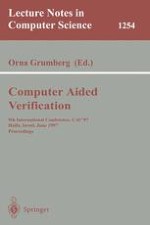1997 | ReviewPaper | Chapter
Module checking revisited
Authors : Orna Kupferman, Moshe Y. Vardi
Published in: Computer Aided Verification
Publisher: Springer Berlin Heidelberg
Included in: Professional Book Archive
Activate our intelligent search to find suitable subject content or patents.
Select sections of text to find matching patents with Artificial Intelligence. powered by
Select sections of text to find additional relevant content using AI-assisted search. powered by
When we verify the correctness of an open system with respect to a desired requirement, we should take into consideration the different environments with which the system may interact. Each environment induces a different behavior of the system, and we want all these behaviors to satisfy the requirement. Module checking is an algorithmic method that checks, given an open system (modeled as a finite structure) and a desired requirement (specified by a temporal-logic formula), whether the open system satisfies the requirement with respect to all environments. In this paper we extend the module-checking method with respect to two orthogonal issues. Both issues concern the fact that often we are not interested in satisfaction of the requirement with respect to all environments, but only with respect to these that meet some restriction. We consider the case where the environment has incomplete information about the system; i.e., when the system has internal variables, which are not readable by its environment, and the case where some assumptions are known about environment; i.e., when the system is guaranteed to satisfy the requirement only when its environment satisfies certain assumptions. We study the complexities of the extended module-checking problems. In particular, we show that for universal temporal logics (e.g., LTL, ∀CTL, and ∀CTL*), module checking with incomplete information coincides with module checking, which by itself coincides with model checking. On the other hand, for non-universal temporal logics (e.g., CTL and CTL*), module checking with incomplete information is harder than module checking, which is by itself harder than model checking.
